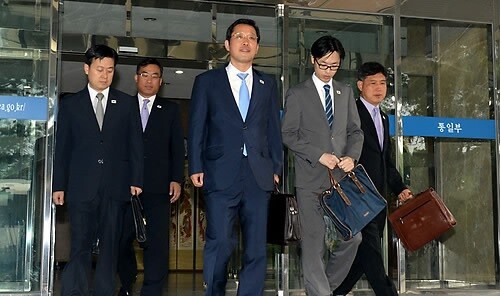hankyoreh
Links to other country sites 다른 나라 사이트 링크
Approved meetings indicate broadening of inter-Korean exchange

By Choi Hyun-june, staff reporter
A series of upcoming inter-Korean meetings - both on an official and on a private level - suggest that there could be a thaw in the icy relations between North and South.
“We have given four representatives from Green One Korea, an organization working for inter-Korean cooperation over forestry, permission to visit North Korea,” said Unification Ministry spokesperson Park Soo-jin on June 25. “The representatives will head to Kaesong on June 26, where they will meet with the North Korean Council for Reconciliation and hold working-level talks about initiating a reforestation project.” From 2007 to 2009, Green One Korea set up tree nurseries in six parts of North Korea and did reforestation work around Pyongyang and Kaesong.
On June 23, the Unification Ministry approved a request by members of the Joint Board of South and North Korea for the Compilation of Gyeoremal-Keunsajeon (a Korean language dictionary) permission to visit the North on June 25.
The fifth meeting of the joint committee for the Kaesong Complex, which includes government officials from both North and South Korea, took place on June 26.
Buddhists in North and South Korea are organizing a joint ceremony to mark the 70th anniversary of the death of Han Yong-un, a Buddhist monk who was also a poet and an independence movement leader. The ceremony will be held at Shingye Temple at Mt. Keumgang in North Korea on June 29.
Significantly, the reforestation and dictionary compilation projects are resuming after a hiatus of four years. Work on these projects was suspended because of the May 24 measures of 2010, which froze inter-Korean cooperation and exchange in response to the sinking of the Cheonan warship in 2010. In particular, allowing representatives of Green One Korea to visit the North is seen as an indication that the South Korean government intends to widen the scope of humanitarian aid to the North, which had been limited to measures that target infants and other vulnerable segments of society.
At the beginning of June, the government allowed members of the Gyeongnam Unification Agricultural Cooperation to travel to the North for a “reunification strawberry” project.
The Kaesong joint committee, which was supposed to be held on a quarterly basis, is also convening after a six-month gap. This will be the first time the committee has met since its fourth meeting, which took place in mid-December 2013. While the committee’s agenda is limited to problems with the operation of the Kaesong Complex, it is significant in the sense that this is the first meeting between North and South Korean officials since such meetings were suspended in February.
Fundamentally, these changes can be attributed to a change in the attitude of North Korea. North Korea had expressed its opposition to South Korean policy toward the North after President Park Geun-hye made her Dresden Declaration in March, and it had been dismissing the very idea of talks with South Korean organizations since May. But more recently, North Korea seems to be changing its stance toward allowing talks with South Korean organizations.
“Looking at the nature of these projects, it would be hard to call this major progress on a governmental level between North and South Korea. The two sides seem to be allowing a modicum of exchange inside an agreed-upon range,” said Chang Yong-seok, senior researcher at the Institute for Peace and Unification Studies at Seoul National University.
The South Korean government is also warning people not to infer that it is expanding the kind of contact with North Korea that it will permit. When asked why the groups were being allowed to visit the North, Park Soo-jin said, “We authorized these groups since we were getting a positive response from North Korea recently that we had not seen since the end of last year.”
Please direct questions or comments to [english@hani.co.kr]

Editorial・opinion
![[Column] Season 2 of special prosecutor probe may be coming to Korea soon [Column] Season 2 of special prosecutor probe may be coming to Korea soon](https://flexible.img.hani.co.kr/flexible/normal/500/300/imgdb/original/2024/0426/3317141030699447.jpg) [Column] Season 2 of special prosecutor probe may be coming to Korea soon
[Column] Season 2 of special prosecutor probe may be coming to Korea soon![[Column] Park Geun-hye déjà vu in Yoon Suk-yeol [Column] Park Geun-hye déjà vu in Yoon Suk-yeol](https://flexible.img.hani.co.kr/flexible/normal/500/300/imgdb/original/2024/0424/651713945113788.jpg) [Column] Park Geun-hye déjà vu in Yoon Suk-yeol
[Column] Park Geun-hye déjà vu in Yoon Suk-yeol- [Editorial] New weight of N. Korea’s nuclear threats makes dialogue all the more urgent
- [Guest essay] The real reason Korea’s new right wants to dub Rhee a founding father
- [Column] ‘Choson’: Is it time we start referring to N. Korea in its own terms?
- [Editorial] Japan’s rewriting of history with Korea has gone too far
- [Column] The president’s questionable capacity for dialogue
- [Column] Are chaebol firms just pizza pies for families to divvy up as they please?
- [Column] Has Korea, too, crossed the Rubicon on China?
- [Correspondent’s column] In Japan’s alliance with US, echoes of its past alliances with UK
Most viewed articles
- 1‘We must say no’: Seoul defense chief on Korean, USFK involvement in hypothetical Taiwan crisis
- 2[Column] Season 2 of special prosecutor probe may be coming to Korea soon
- 3N. Korean delegation’s trip to Iran shows how Pyongyang is leveraging ties with Moscow
- 4Amnesty notes ‘erosion’ of freedom of expression in Korea in annual human rights report
- 5[Reportage] On US campuses, student risk arrest as they call for divestment from Israel
- 6Korea sees more deaths than births for 52nd consecutive month in February
- 7[Editorial] New weight of N. Korea’s nuclear threats makes dialogue all the more urgent
- 8‘Weddingflation’ breaks the bank for Korean couples-to-be
- 9[Column] Has Korea, too, crossed the Rubicon on China?
- 10[Column] Park Geun-hye déjà vu in Yoon Suk-yeol